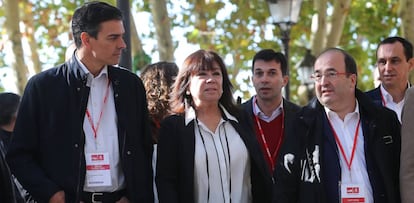Socialists rule out power-sharing deal with separatists after Catalan election
But center-right party Ciudadanos does not trust the PSC, which has also refused to create a unionist alliance

The Spanish Socialist Party (PSOE) and its Catalan branch, the PSC, have ruled out the possibility of any governing deals with Catalonia’s separatist forces after the regional election of December 21.
Even if the Catalan Republican Left (ERC) and the ousted premier Carles Puigdemont, of PDeCAT, were to openly renounce their idea of unilateral independence, there would still be no hope of recreating the kind of leftist coalitions that governed the region between 2003 and 2010 under Socialist premiers.
The trouble with Iceta is that he says different things on different days
Ciudadanos chief Albert Rivera
“The PSC will not hand the premiership to [ERC leader] Oriol Junqueras or to Carles Puigdemont or to [his predecessor] Artur Mas,” said PSC leader Miquel Iceta on Tuesday, blaming these individuals for taking Catalonia “to the brink of the abyss.”
In a television interview on Spanish network Cuatro on Monday, Socialist chief Pedro Sánchez had said that their Catalan branch rejects “any formula involving governance by individuals or political parties that stand outside the Constitution and the Catalan Statute.”
No unionist alliance
But both Socialist leaders added that they will not necessarily support Ciudadanos if, as polls indicate, it becomes the most-voted non-separatist party on December 21. Ciudadanos has been trying to craft a coalition of unionist parties much in the same way as separatists came together for the 2015 election despite their ideological differences.
A minimum of 68 seats are required for an absolute majority in the 135-seat regional assembly.
Ciudadanos leader Albert Rivera has suggested that the PSC may instead want to revisit its earlier three-way coalitions, known popularly as the tripartitos. This time, the PSC could team up with ERC and the leftist group Catalunya en Comú (Catalonia in Common), whose national spokesperson is Barcelona Mayor Ada Colau.
Sánchez rejects formulas involving governance by parties that stand outside the Constitution and the Catalan Statute
This idea was in fact put to the PSOE in late October by Podemos leader Pablo Iglesias, whose Catalan branch Podem is part of Catalunya en Comú. However, the recent breakup between the PSC and Colau’s party inside Barcelona City Council has poured cold water over this scenario.
But Ciudadanos leader Albert Rivera says he does not trust Iceta’s assurances.
“The trouble with Iceta is that he says different things on different days in order to keep everyone happy,” Rivera said on Tuesday. “All I know for sure about his political career is that he was the driving force behind two tripartitos. And where there’s room for two, there’s room for three.”
Rivera is now appealing directly to PSOE leader Pedro Sánchez: “I urge him not to make a mistake. Instead of aligning himself with the separatists, he should side with the constitutionalists.”
English version by Susana Urra.
Tu suscripción se está usando en otro dispositivo
¿Quieres añadir otro usuario a tu suscripción?
Si continúas leyendo en este dispositivo, no se podrá leer en el otro.
FlechaTu suscripción se está usando en otro dispositivo y solo puedes acceder a EL PAÍS desde un dispositivo a la vez.
Si quieres compartir tu cuenta, cambia tu suscripción a la modalidad Premium, así podrás añadir otro usuario. Cada uno accederá con su propia cuenta de email, lo que os permitirá personalizar vuestra experiencia en EL PAÍS.
¿Tienes una suscripción de empresa? Accede aquí para contratar más cuentas.
En el caso de no saber quién está usando tu cuenta, te recomendamos cambiar tu contraseña aquí.
Si decides continuar compartiendo tu cuenta, este mensaje se mostrará en tu dispositivo y en el de la otra persona que está usando tu cuenta de forma indefinida, afectando a tu experiencia de lectura. Puedes consultar aquí los términos y condiciones de la suscripción digital.








































